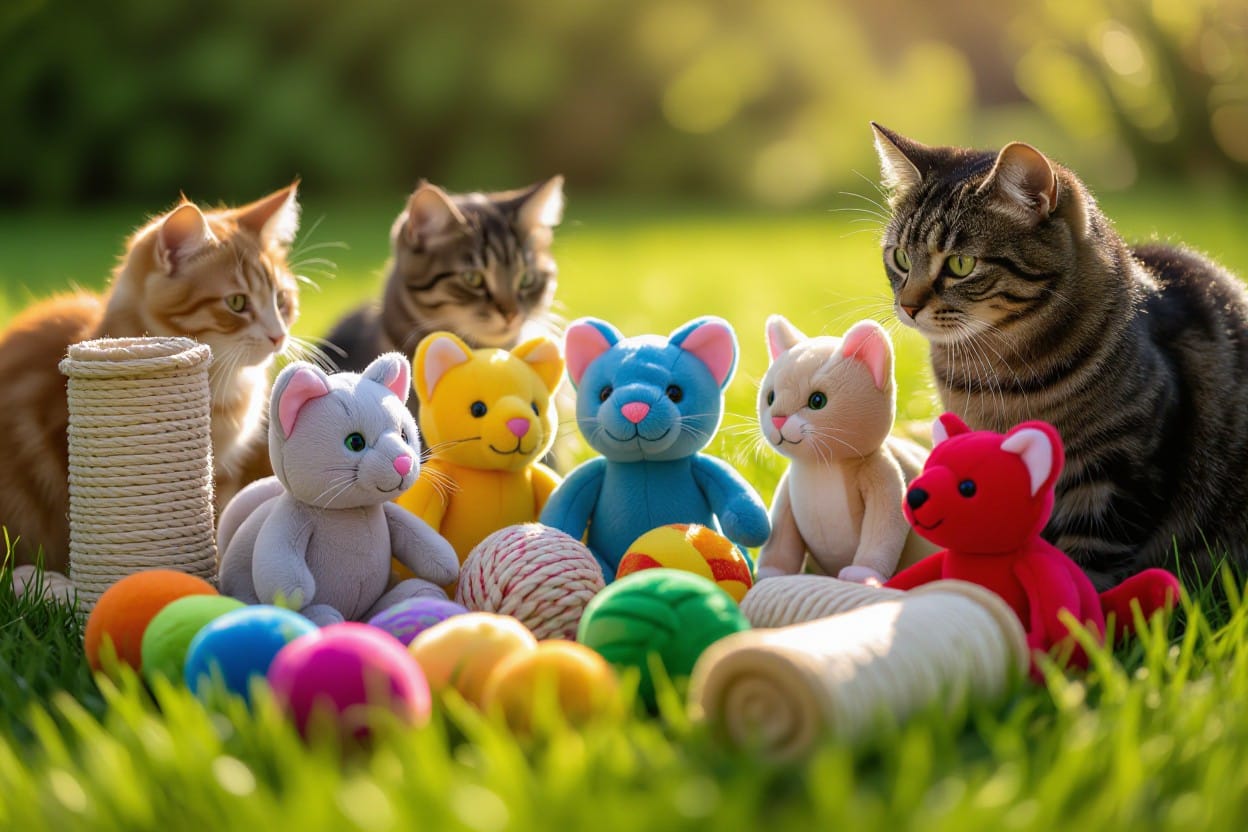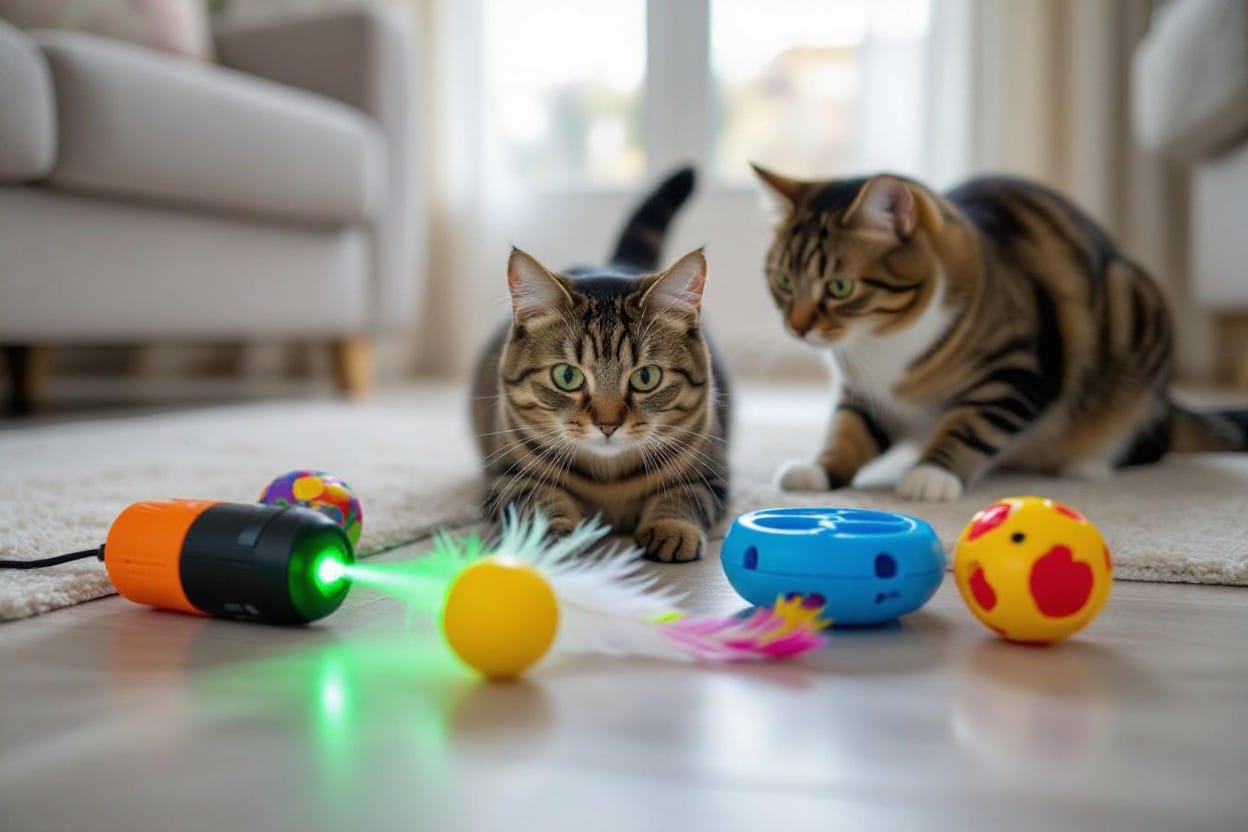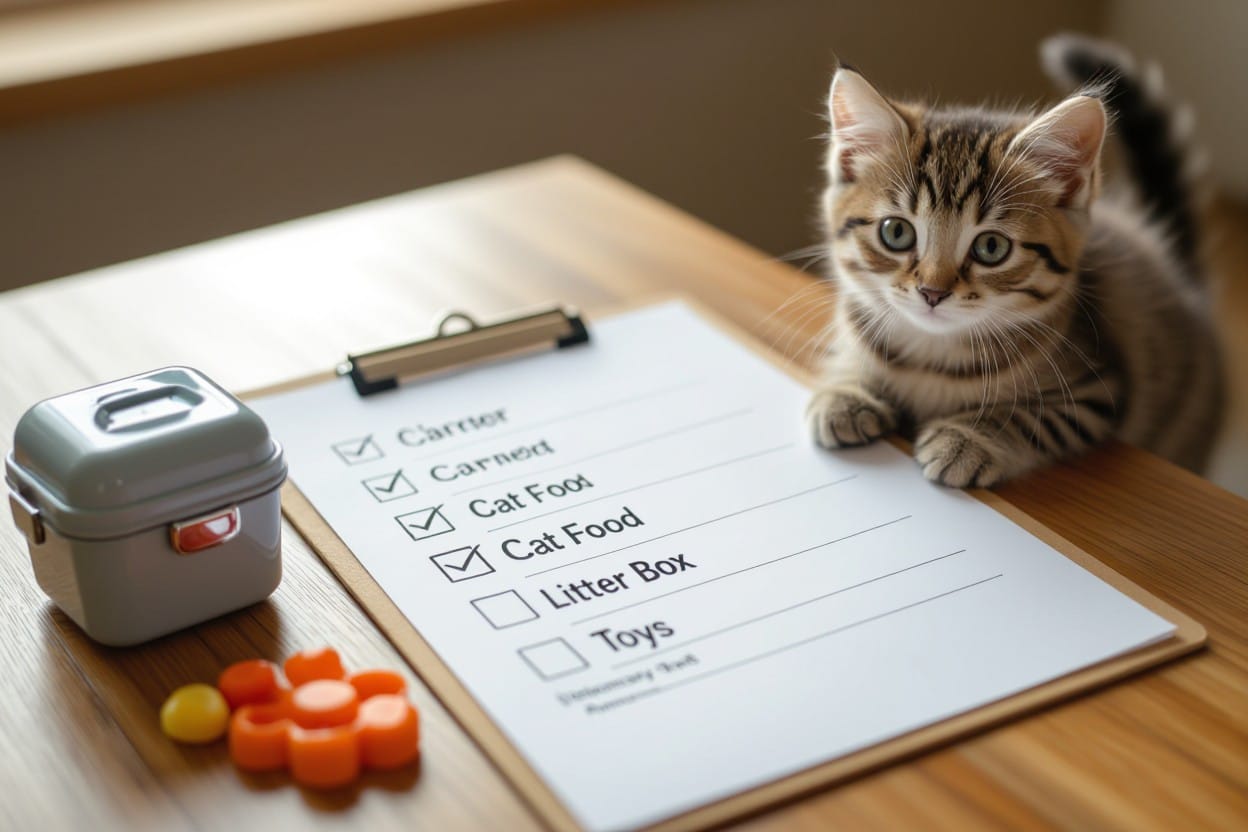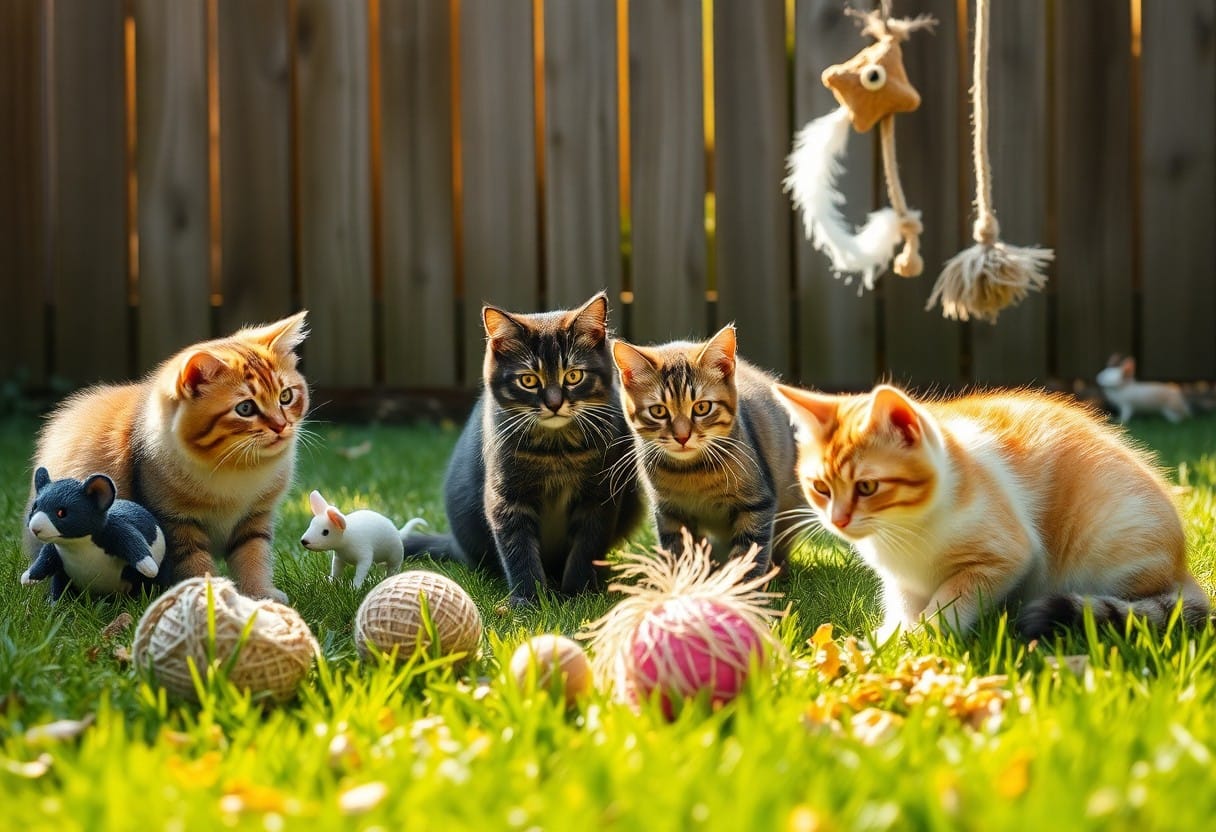Many new pet owners who have adopted kittens may find themselves facing challenges when it comes to building trust and love with their new feline companion. This crucial bonding period sets the foundation for a strong and lasting relationship between you and your adopted kitten. Patience, understanding, and consistency are key elements in establishing trust and fostering affectionate feelings in your furry friend.
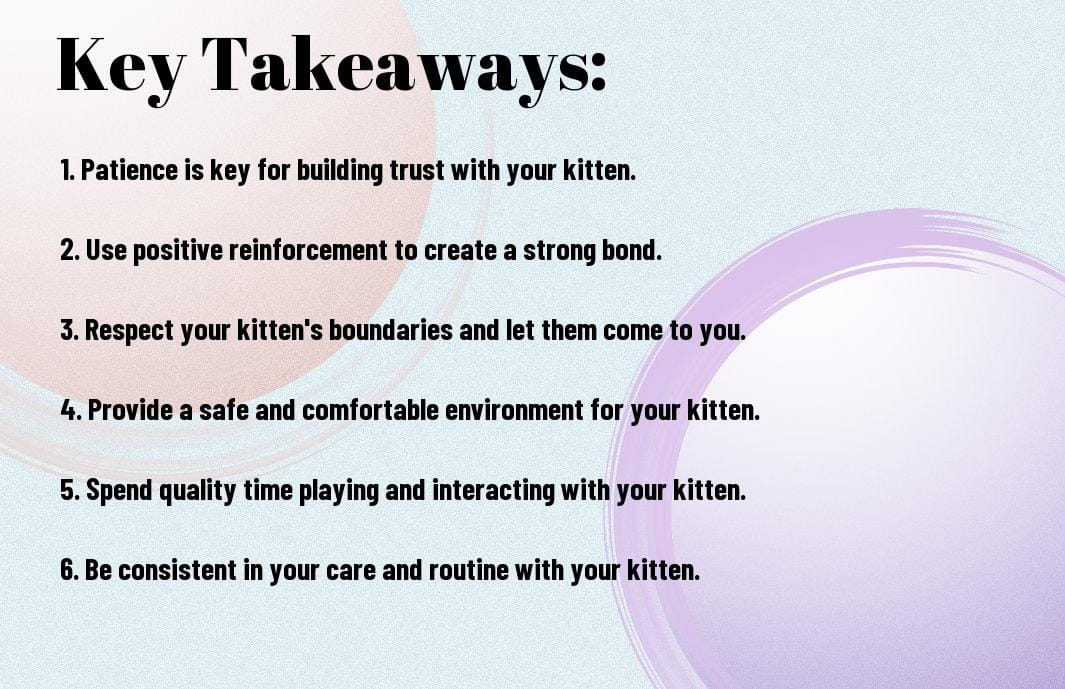
Understanding Kitten Behavior
Decoding Kitten Communication
With their adorable faces and curious antics, kittens communicate in a variety of ways that may not always be obvious to new pet parents. Understanding these cues is crucial in building a strong bond with your adopted kitten. From gentle purring to playful tail flicks, they use their body language to convey their thoughts and feelings. By paying attention to their posture, vocalizations, and gestures, you can decipher what your kitten is trying to tell you.
Common Behavioral Traits in Kittens
Understanding common behavioral traits in kittens can help you navigate the quirks and habits of your furry companion. Kittens are known for their energetic and playful nature, often engaging in bursts of activity followed by long naps. They also have a strong instinct for hunting and exploring their surroundings. Providing them with appropriate toys and opportunities for exploration can help satisfy their natural behaviors and prevent boredom.
Kittens may also exhibit behaviors such as kneading, which is a sign of contentment and comfort. Understanding these behaviors can help you create a loving and enriching environment for your adopted kitten.
Preparing Your Home for Your New Kitten
Creating a Safe and Welcoming Environment
Safe and welcoming environment is key to helping your adopted kitten feel secure and comfortable in their new home. Before bringing your kitten home, it’s important to kitten-proof your living space. Remove any potential hazards such as toxic plants, small objects that could be swallowed, and secure loose cords or wires that could be a danger. Provide cozy spots for your kitten to retreat to, like a soft bed or a designated area with a blanket.
Essential Supplies for Your Kitten’s Comfort
With the right important supplies, your kitten will quickly acclimate to their new environment. Make sure to have a litter box, high-quality kitten food, food and water dishes, a scratching post, toys for playtime, and a comfortable bed ready before your kitten arrives. These items will help meet your kitten’s basic needs and create a sense of stability in their new environment.
Another important supply for your kitten’s comfort is a scratching post. Cats have a natural instinct to scratch, and providing a scratching post will help prevent your furniture from becoming their target. Choose a sturdy scratching post that is tall enough for your kitten to stretch fully, as they grow quickly and will need the right size to accommodate their full grown size.
The First Encounter
How to Approach Your Kitten
Your first encounter with your newly adopted kitten is a crucial moment that sets the tone for your future relationship. Approach your kitten with gentleness and patience. Note, your kitten may be feeling scared and unsure in a new environment. Allow your kitten to approach you on their terms, avoiding sudden movements or loud noises that may startle them. Get down to their level and use calm, soothing tones to communicate with them.
Setting the Tone for Future Interactions
During this initial encounter, it’s important to establish a sense of trust and safety for your kitten. Offer your hand for them to sniff and let them come to you for pets or affection. Avoid overwhelming your kitten by giving them space to explore their surroundings at their own pace. By respecting your kitten’s boundaries and showing them kindness, you are laying the foundation for a strong bond built on trust and love.
With time and patience, your kitten will start to feel more comfortable and secure in their new home. This first encounter is the beginning of a beautiful journey together, full of love, companionship, and mutual understanding.
Building Trust with Patience and Consistency
Many new pet parents are eager to form a strong bond with their adopted kitten, but it’s necessary to approach the process with patience and consistency. Building trust takes time, especially for an animal that may have experienced trauma or changes in their life. By consistently showing your kitten love, care, and respect, you can help them feel secure and build a lasting relationship based on trust.
The Role of Gentle Handling
Gentle handling is key when it comes to gaining your kitten’s trust. Approach your feline friend with soft movements and a calm demeanor. Avoid sudden movements or loud noises that could startle them. Speak in soothing tones and offer gentle pets and scratches to show your kitten that you are a safe and loving presence in their life.
Establishing a Routine for Your Kitten
Your kitten thrives on routine and predictability. By establishing a consistent daily schedule for feeding, playtime, and rest, you can help your kitten feel secure and build trust in their environment. Stick to regular feeding times and play sessions to create a sense of stability for your furry friend.
A structured routine also helps your kitten understand what to expect from you, making them more comfortable and confident in their interactions with you. Consistency is key in building trust and strengthening your bond with your adopted kitten.
The Art of Socialization
After bringing your newly adopted kitten home, one of the most important aspects of bonding and building trust is through socialization. Socialization is the process of getting your kitten accustomed to their new environment, including other pets and people.
Introducing Your Kitten to Other Pets
Any introductions between your new kitten and other pets should be done gradually and carefully. Allow the pets to get acquainted with each other’s scents by swapping bedding or using a Feliway diffuser to help reduce stress. When ready for a face-to-face introduction, ensure it is in a neutral territory and monitor their interactions closely to prevent any potential conflicts.
Encouraging Positive Interactions with People
People play a crucial role in developing your kitten’s social skills and building trust. Encourage friends and family members to interact with your kitten in a calm and gentle manner. Provide treats and positive reinforcement to create a positive association with human contact. It’s important to teach children how to properly handle and play with the kitten to prevent any accidental harm or stress.
The key to encouraging positive interactions with people is to expose your kitten to a variety of individuals, situations, and environments in a controlled and positive way. This will help your kitten develop into a well-adjusted and social adult cat who is comfortable around people of all ages and backgrounds.

Training and Playtime
Basic Obedience Training for Kittens
Keep in mind that training a kitten is not the same as training a puppy. While some basic obedience training can be done, such as teaching them their name and responding to simple commands like ‘sit’ or ‘come’, it’s important to remember that kittens have shorter attention spans and may not follow instructions as readily as a dog. Patience and positive reinforcement are key when training your kitten.
The Importance of Play in Your Kitten’s Development
The play is imperative for a kitten’s development as it helps them to learn vital skills such as coordination, hunting techniques, and social interaction. Interactive play with toys like feather wands, laser pointers, or crinkle balls not only provides physical exercise but also stimulates their mental faculties. Make time in your daily schedule for play sessions with your kitten to help strengthen your bond and ensure they are mentally and physically healthy.
To encourage healthy play behavior and prevent boredom, provide a variety of toys that mimic hunting activities. Interactive toys that mimic the movement of prey can keep your kitten engaged and satisfied. Remember to rotate their toys regularly to keep them stimulated and prevent them from losing interest in their playthings.
Training
Regular playtime is a crucial aspect of your kitten’s development and overall well-being. It provides physical exercise, mental stimulation, and an opportunity for bonding between you and your furry companion. Engage in interactive play sessions daily to keep your kitten happy, healthy, and mentally sharp.
Health Care for Your Adopted Kitten
Once again, congratulations on adopting your new kitten! Ensuring your kitten’s health is of utmost importance in providing them with a happy and fulfilling life. Regular veterinary care plays a crucial role in maintaining your kitten’s well-being and catching any potential health issues early on.
Regular Veterinary Check-ups
Veterinary check-ups are crucial for monitoring your kitten’s overall health and addressing any concerns promptly. During these visits, your veterinarian will conduct a physical examination, administer vaccinations, and recommend preventive measures such as flea and tick control.
Understanding and Upkeeping Your Kitten’s Health
Understanding your kitten’s health needs is vital in providing them with the proper care they require. This includes feeding them a nutritious diet, ensuring they have access to fresh water at all times, and providing a clean and safe environment for them to thrive in.
Health: Keeping your kitten healthy goes beyond just regular veterinary check-ups. It involves being proactive in observing any changes in their behavior, appetite, or litter box habits. As a pet owner, you play a crucial role in maintaining your kitten’s health and well-being.
Addressing and Preventing Behavioral Issues
Common Kitten Problems and Solutions
One of the most common behavioral issues in kittens is scratching furniture or other household items. To prevent this, provide appropriate scratching posts and toys to redirect their behavior. Another issue is litter box problems, which can be solved by ensuring the litter box is kept clean and in a quiet, accessible location. If your kitten is showing signs of aggression, it’s imperative to provide positive reinforcement and engage in interactive play to channel their energy in a positive way.
When to Seek Professional Help
The key sign that it’s time to seek professional help for your kitten’s behavioral issues is when they become uncontrollable or start impacting their quality of life. If your kitten is displaying extreme fear or anxiety, or if their behavior is becoming increasingly aggressive, it’s crucial to consult with a veterinarian or animal behaviorist. Note, seeking help early can prevent the escalation of behavioral problems in the future.
The decision to seek professional help for your kitten’s behavioral issues should not be taken lightly. It’s important to address these issues promptly to prevent them from becoming ingrained habits that are difficult to break. Professional guidance can provide you with the tools and strategies needed to effectively manage your kitten’s behavior and strengthen the bond between you.
Another important reason to seek professional help is if your kitten is exhibiting unusual behaviors such as excessive meowing, hiding, or destructive tendencies that cannot be resolved through simple training techniques. A professional can help identify the underlying cause of these behaviors and tailor a behavior modification plan to suit your kitten’s individual needs.

Strengthening Your Bond Over Time
Celebrating Milestones with Your Kitten
With each passing week and month, your bond with your adopted kitten will continue to grow stronger. It’s imperative to celebrate the milestones along the way to acknowledge the progress you’ve made together. Whether it’s their first successful potty training, their first playful interaction with a toy, or even the first time they curl up on your lap for a nap, these moments are opportunities to bond and build trust.
The Lifelong Benefits of a Strong Bond
Bonding with your adopted kitten doesn’t just benefit the here and now; it sets the foundation for a lifetime of companionship and love. A strong bond can lead to a happier, more well-adjusted cat who is confident and secure in their relationship with you. This trust and connection will not only bring joy to your life but also improve your kitten’s overall well-being.
To ensure a deep bond with your kitten, it’s imperative to prioritize spending quality time together, engaging in activities that they enjoy, and providing a safe and loving environment for them to thrive in.
Summing up
On the whole, bonding with your adopted kitten is a gradual process that requires patience, consistency, and love. By providing a safe and nurturing environment, spending quality time together, and using positive reinforcement training, you can build trust and strengthen your bond with your new furry friend. Remember that every kitten is unique and may require different approaches, so be adaptable and attentive to their individual needs. With time and dedication, you will see your relationship with your adopted kitten grow into a strong and loving bond that will last a lifetime.
FAQ
Q: Why is bonding with your adopted kitten important?
A: Bonding with your adopted kitten is important because it helps to build trust and create a strong emotional connection, which is vital for a happy and healthy relationship.
Q: How can I build trust with my adopted kitten?
A: Building trust with your adopted kitten takes time and patience. Spend quality time with your kitten, provide a safe and comfortable environment, and be consistent in your care and interactions.
Q: What are some ways to show love to my adopted kitten?
A: Showing love to your adopted kitten can be done through gentle petting, playing together, providing treats, and speaking to them in a soothing voice. Creating a bond through positive experiences will help strengthen your relationship.
Q: What should I do if my adopted kitten is fearful or skittish?
A: If your adopted kitten is fearful or skittish, give them space to feel safe and secure. Avoid forcing interactions and instead let them come to you at their own pace. Use positive reinforcement with treats and praise to help build their confidence.
Q: How can I ensure a smooth transition for my adopted kitten into my home?
A: To ensure a smooth transition for your adopted kitten into your home, create a designated safe space with all the vitals they need. Allow them to explore at their own pace, gradually introducing them to other areas of the house. Establish a routine for feeding, playtime, and bonding to help them feel secure and comfortable in their new environment.
